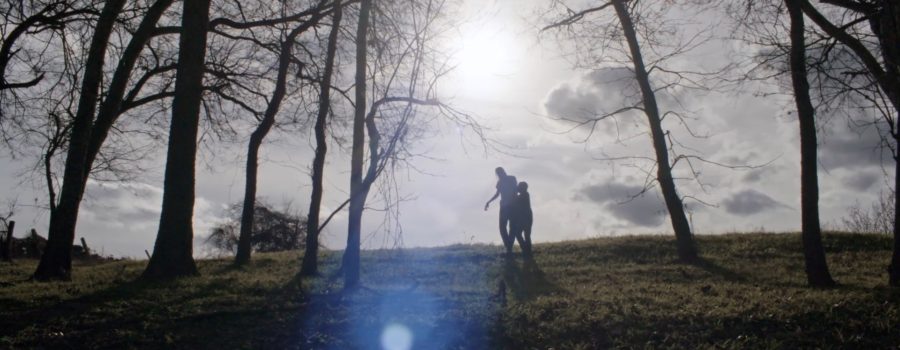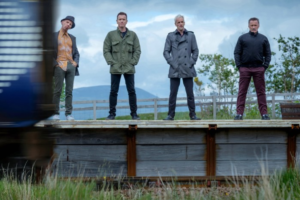[Published at Awards Circuit] 2017 Berlin International Film Festival: Auteur Travis Mathews’ (“Interior. Leather Bar”) latest directorial effort, “Discreet,” is making its U.S. debut at the San Francisco International Film Festival (SFIFF) on April 8. During my Berlinale coverage for Awards Circuit, I had the chance to sit down with Mathews and the film’s star, Jonny Mars, who starred in a record-setting seven films at SXSW in 2013. They discuss the inception of the film, its trailblazing confrontation on film of the emerging white nationalist “alt-right” movement and its influence inside and outside the LBGTQ community, racism, stereotypes and so much more.

Director Travis Mathews
Awards Circuit: First off guys, I enjoyed your film thoroughly. I think it tackles subjects that are immediate and essential. How did the two of you conceive this idea, because I know you’re a producer, Johnny, on the film as well, so there was an artistic collaboration. So when did this idea first develop?
Travis: It first came about in the summer of 2015. I had just come off a project that ended up being suspended indefinitely, and I‘d worked on it a long time, and I felt the need to do something urgent that felt bold, that felt of the moment. And, I didn’t know Johnny yet but, I was basically taking the pulse of the road around me in central Texas. And this involved gay hookup apps – just seeing the level of racism, internalized homophobia, all of that that’s on there. And then also kind of making my own connections with this emerging alt-right movement in America and the sort of like – these people who used to be on the fringes who now feel power, you know? And I felt this palpable anxiety in the air in the sense of danger on the horizon. So that’s kind of the seeds of the character of Alex; I wanted to combine those things and then feed them through a character. And I had basically like a two or three page treatment, and I was sharing it with some people in Austin, and I swear everybody I was sharing it with was just like, ‘Why haven’t you shown Jonny Mars this yet.’ I was like I don’t know Jonny. And then we were introduced by a filmmaker friend and, I’ll let Jonny speak to this but, I think initially we just had a lot of conversations about politics and quickly understood that we got each other. And there was a trust that was developed really quickly. And this character really came to life together through a few month process before we started filming. We were filming exactly this time last year.
Jonny: Yeah, exactly a year ago. I was filming another movie in North Texas, and on my day off he [Travis] was in Austin. We met in the middle in a little town called Waco, Texas which is actually where the Branch Davidian compound burned down in the ’90s.
Awards Circuit: Sure, isn’t it near Dallas?
Jonny: Yeah, it’s about 90 minutes south of Dallas, yeah and about 90 minutes North of Austin, so we met in the middle and we met at a – it’s a famous gas station called ‘The Czech Stop’ and we had some sandwiches and we got in the van and drove around.
Travis: Because the van was the van I was using in the movie, it was also an inspiration.
Jonny: So we drove around rural Texas until the sun went down, listening to talk radio and he just kind of pitched me this fever dream of what he was feeling at the time and what he was seeing and I was agreeing, like there was definitely something going on in America at that time that was just still happening and it’s –
Awards Circuit: And that’s only magnified –
Jonny: Yeah, and it’s scary and it’s dark and it’s, it’s everything that Alex is dealing with. It’s shame, it’s trauma, it’s progression, it’s tribalism. It’s just all these things and Alex is the birth of that horrible synergy, and it was our attempt to – we’ve never spoken on this, but I really feel like it’s honestly like a meditation for us to understand what the fuck is going on in the world and how is this allowed to persist, you know? So I think it was, as much as anything, it was therapy for us to try to just understand –
Travis: Absolutely, absolutely –
Jonny: – our place in the world now and who we are.
Travis: I won’t say it’s funny. It’s not funny, but it’s ironic I guess; it’s almost like the movie was – like we didn’t imagine we’d be living in a Trump authoritarian regime. Like everybody, we thought things were going in a different direction. So, in a lot of ways, I felt like what we were making was kind of the pinnacle of this –
Jonny: The end of it.
Travis: Yeah, the end of it, and it was almost like a cautionary tale, this nightmare cautionary tale. But now of course it seems more of a reflection of where we are at, if you wanna read into it that way.
Awards Circuit: Sure, I mean it’s wild because, particularly in Texas, it’s one of, if not the most hostile and prejudiced states. And not to talk bad about Texas, but it’s a fact –
Jonny: There are pockets. There are a lot of good people there, but, to your point, there are pockets of hatred.
Awards Circuit: Yeah, yeah. For instance, Houston is actually one of the most diverse areas in the world, but naturally it’s like any melting pot, and there’s tension. When you were driving around in the car conceiving of this idea, were there actually talk radio hosts that were vocalizing these scary –
Travis: Yeah! Oh god, yeah! I would record them on my phone sometimes because I wanted – there was one point, it’s funny how quickly – I have a horrible memory, and it’s funny how quickly I forget certain elements of things that I wanted to do in projects that then got left in the wayside. Like at one point I wanted to record a lot of the real live talk radio. I mean there’s talk radio in the movie, but I wanted to record a lot of the things that I was hearing and then weave these real conversations into the film. I mean they’re there, but certainly, on the radio. I know on AM radio, there is a lot of that, but there was even [some] on FM radio – in Texas, there’s channels that cater to that –
Jonny: Even just Drive Time Radio in Texas – FM Drive Time Radio where they played pop – the DJs come on, and they are advertising something that’s just so incorrect and backwards, it’s baffling. And they have – they have an audience, they have a huge share of an audience, and they are catering to that. They were gas lighting the whole time you know.
Awards Circuit: Where I’m from in San Francisco, if you heard that on the radio, you would be like, pardon my language, “What the fuck?”
Jonny: Yeah!
Awards Circuit: Like that would – you would never hear that on the radio in a place like San Francisco. That person would be fired immediately from the station.
Jonny: And one of those guys was Alex Jones a pivotal person in number 45’s [Trump’s] cabinet, his journey into getting elected president. He’s based in Austin, he’s got a huge following in Texas –
Travis: I didn’t know he was based in Austin –
Jonny: Yeah, and that’s why we would hear him constantly, you know? He’s got a print media empire down there. I mean Infowars is a big thing and I hate that I’m saying his name and talking about his publication because, FUCK THAT GUY!
Awards Circuit: Yeah!
Jonny: He’s a disinformation strategist, frankly. He’s a conspiracy theorist that is ultimately hurting America.
Awards Circuit: And now that language is being used by the President himself. And over the past six months, the president, the status, the value of the president, and the meaning behind it is just gone.
Travis: Yep!
Awards Circuit: In talking about your performance, Jonny, there’s a lot of drawn out scenes with no dialogue, where it relies on just your facial expressions. It’s always something I’ve been extremely interested in – how an actor can convey so much with little or no dialogue. What was your artistic process and preparation – often times you’re on the verge of tears, you’re showing anguish, you’re showing inner-conflict. Walk me through [your process] on a given day.
Jonny: Yeah! Our schedule was tough, we didn’t have two months to make this movie, so I was having to swing through a gamut of emotions per day and it definitely could get exhausting and Travis was great in terms of like a football coach who would kind of just draft out like – if I’ve got to go here, can we move maybe this scene near it because emotionally they are connected and it will make for an easier transition, emotionally, for me, and hopefully you can help create that emotional narrative, if you will, more so. But at the same time, from my own research in relationships with people who have dealt with trauma, childhood trauma and sexual abuse – and what that is, how the world works for them and what is under the surface is – it’s raw. It’s raw. And that was something Travis and I have talked about a lot and I really wanted to make that – give that the emotional honesty that it deserved. And I hope we got there but it always had to be bubbling under the surface, in our opinion, for Alex to make some of the decisions he makes, good or bad, and for you to feel why, and understand what shame does to the human soul in the journey he’s on. Through my own process I’ve developed throughout the years, I try to work with music, and I had several songs – I kind of create a soundtrack typically per movie, for the characters I’m working on, and so I had my bag of music I would go to and when we knew we had to do a scene that was gonna be tough, I’d say I need five minutes, and I’d literally sit in the van and shut all the doors and cross my legs and just get lost in the music, you know? Because I did all my prep according to those songs, so it’s just, for me, a quick entry point to try to get to these emotional places.
Awards Circuit: And they were artists that you liked?
Jonny: Yeah, songs, current songs, songs from the ancient past, you know? They went from all over; some of them were ’60s R&B and Doo-wop. A lot of it’s in the film; even the film’s soundtrack and score that Travis used to put the movie together was stuff he sent me early on. And that was in my bag of tricks too, trying to create that space where you’re not allowed to use words and I think, as a performer for me, that’s a very scary place to be, just to have a camera just rolling on you while you try to externalize what’s internal without using dialogue.
Awards Circuit: Travis, your films have confronted homosexuality straight-on and, and what they –
Travis: No pun intended, sorry, just being silly.
(laughs)
Awards Circuit: It’s necessary because it’s confronting a prejudice that’s been around since the beginning of time.
Travis: Mmmh.
Awards Circuit: [Historically] somehow it’s not accepted. Whether it’s based on religion, the way religion represses that, or society represses you being yourself. The fact of the matter is that homosexuality is just a thing, it’s not a label. Some people are straight, some people are gay, it’s just a fact. Do you think the sentiment has changed since you began filmmaking, towards more acceptance of homosexuality, granted before the Trump administration –
Travis: Yeah, a couple of things: I mean, one, I feel like it’s well documented that progress doesn’t always happen, and social justice doesn’t happen in a straight linear line. And I think that [while] there are setbacks, it’s hard to argue that there hasn’t been a lot of progress and a lot of like rights won and a lot of acceptance that’s been gained. But, I mean, I want to say, I feel like the work that I’ve done is even a challenge within the gay community. Because I feel like a lot of the early documentary work I did – like that’s in the “Room” series – part of my reasons for doing that was because I didn’t feel like I was represented in the gay media I was seeing, or my friends were represented in that kind of gay media world. And so there’s two fights: there’s this sort of larger fight that you’re getting at, and then there is the one within the gay community itself to be like, ‘okay, okay, okay, but there’s also this.’ There’s also this – that I personally feel is more important not because it’s me or my people, but because my intentions with all of the work that I’ve done leading up to “Discreet” is to dig in – and this is where my psychology interest and background comes in – is to dig into intimacy and vulnerability and things that are sometimes difficult, especially for men who are straight or gay to come forward with. And to me, those are exciting places to explore and are important places to explore. Like early on, I mean less so now, but early on, the stuff that I was making like in the “Room” series in particular, I was making stuff I wish I had seen as a teenage boy living in rural Ohio. You know? I mean when I grew up in the late ’80s, it was like if you were gay – the internet didn’t exist really, and I didn’t have cable TV, and so my only media that I saw of gay life was either people dying of AIDS or drag queens and crazy characters that were on like ‘The Phil Donahue Show.’ And so I didn’t feel like there was any representation. And then once I moved to bigger cities – I live in San Francisco, as well –
Awards Circuit: Oh, nice!
Travis: Once I moved to San Francisco, I started to see that there were these different communities that existed, but we weren’t seeing them, and we weren’t seeing all of these different layers of what – the humanity of being a gay person, just like any other person. I feel like that’s very different now than it was even 10 years ago, but there’s still work to be done as always.
Awards Circuit: Absolutely. The one final question I have [regards] the difficulty of bringing humanity to a character that has a tendency towards pedophilia and doesn’t quite know how to deal with it. And it’s also the conflict as a result of abuses of the past. So it must have been difficult bringing humanity to a character that so often in film has been portrayed as just a singular monster with no substance. But really, Jonny, your character Alex has a heart, and the audience actually sympathizes for him. And that’s something that’s so hard to do.
Travis: Yeah, that’s a good question. I think that, the short answer, as we pick up our stuff – I would say the short answer is, even though Alex is an eccentric kind of weirdo, you do enough putting the sympathy in there before you challenge that sympathy, you know?





![Kelly Macdonald & Director Marc Turtletaub Discuss “Puzzle” And How Jigsaws Can Make A Great Film [Interview]](https://www.makingacinephile.com/wp-content/uploads/2018/11/puzzle-kelly-macdonald-marc-turtletaub-1200x520-300x200.jpg)


Leave a Reply
Your email is safe with us.